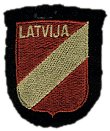A10 305 336
He was charged with having advocated and assisted in the persecution of Jewish persons because of race, religion and national origin near his native city of Rigs and at Dwinsk, Latvia. Other allegations are that at the Dwinsk ghetto he participated in the selection of Jews for execution in the Pogulanka woods around June 1941; and that he also acquiesced in assaults upon a group of Jews at the Dwinsk ghetto in June 1941 and in July 1941 at the Police Station in Riga, Latvia. He was charged with deportability under section 241(a)(1) of the Immigration and Nationality Act, and section 7(b) of the Refugee Act of 1953, in that at the time of entry he was excludable because he was not entitled to the immigrant visa Issued to him under the Refugee Act of 1953. Section 14(a) of that Act excluded persons who had personally advocated or assisted in the persecution of any person or group of persons because of race, religion, or national origin. An additional charge of deportability was lodged at the hearing under section 241(a)(2) of the Act, 8 U.S.C. 1251 (a)(2) in that the respondent had allegedly failed to establish the date, manner and place of entry Into the United States as required under section 291 of the Act, 8 U.S.C. 1361, even though it contradicted the improper entry as a displaced person charge (Tr. p. 682-690).
On February 27, 1980, the Immigration judge rendered his decision In the respondent's case. He found that deportability had not been established by clear, convincing and unequivocal evidence as required by Woodby v. INS, 385 U.S. 276 (1966) and 8 C.F.R. 242.14(a). Crucial to the immigration judge's decision, in the Service's estimation, was the fact that he excluded from admission into the record a photo display which had been submitted by the Service (Tr. p. 853), gave little weight to several of the witnesses' testimony and excluded from the record part of the respondent's visa.
In addition, the Service charged on November 28, 1979 that the immigration judge was biased, based on a comment made by him two years earlier on October 28, 1977, during the deportation hearing (Tr. p. 389-390). Consequently, the Service made a motion to recuse. The immigration judge denied the motion to recuse finding that there was no basis in fact or law in the record to grant the motion. The Service appealed from the denial of that motion and that appeal is also presently before us along with the Service's appeal from the immigration judge's decision terminating the deportation proceedings.
3
